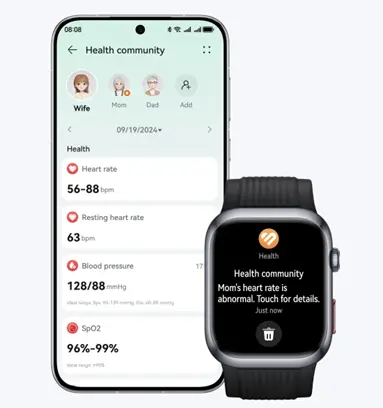Managing blood pressure in elders is paramount for their overall health and well-being. High blood pressure, or hypertension, is a common condition that can lead to severe health issues such as heart disease, stroke, and kidney problems if not addressed timely. Implementing effective strategies for blood pressure care can significantly improve the quality of life for seniors. This blog explores essential tips for managing blood pressure in elders, discusses lifestyle modifications, and highlights the role of modern health technology like the huawei d2 watch in monitoring blood pressure efficiently.
Why Is Blood Pressure Management Crucial for Elders?
Understanding the Risks of High Blood Pressure in Elders
High blood pressure is particularly dangerous for elders due to the increased risk of complications. Elders are more susceptible to the damaging effects of prolonged hypertension, including heart attacks, strokes, and vascular diseases. When left unmanaged, high blood pressure in elders can accelerate the progression of cognitive decline and lead to a higher incidence of Alzheimer’s and other forms of dementia.
How Aging Impacts Blood Pressure Levels
As individuals age, their blood vessels gradually lose elasticity, causing blood pressure levels to rise. The heart also works harder to pump blood, which can lead to an increase in blood pressure. Age-related changes in kidney function can further affect fluid and electrolyte balance, contributing to hypertension. These factors highlight the need for consistent monitoring and management to maintain optimal blood pressure levels.
Consequences of Neglecting Blood Pressure Care
Ignoring blood pressure management in elders can result in severe and often irreversible health conditions. Consistently high blood pressure can damage arteries, strain the heart, and impair kidney function. This neglect can lead to heart failure, chronic kidney disease, and an overall decline in an elder’s health. Early intervention and consistent care are critical to preventing these adverse outcomes.
What Lifestyle Changes Can Help Control Blood Pressure in Elders?
Diet and Nutrition for Healthy Blood Pressure
Maintaining a heart-healthy diet plays a vital role in managing blood pressure. Seniors should prioritize meals that include plenty of fruits, vegetables, whole grains, and lean protein sources while limiting their sodium intake. The DASH diet (Dietary Approaches to Stop Hypertension) is especially beneficial, as it focuses on fresh produce, nuts, and low-fat dairy products. Staying well-hydrated and consuming alcohol in moderation are also key to supporting healthy blood pressure levels.
Importance of Regular Physical Activity
Regular physical activity is vital for controlling blood pressure. Elders should aim for at least 150 minutes of moderate-intensity aerobic exercise per week, such as walking, swimming, or cycling. Strength training exercises can also be beneficial. Exercise helps maintain a healthy weight, reduces arterial stiffness, and improves heart health, all of which contribute to better blood pressure control.
Management Techniques for Seniors
Managing stress is an often-overlooked aspect of blood pressure care. Chronic stress can lead to temporary spikes in blood pressure and, over time, contribute to long-term hypertension. Techniques such as mindfulness meditation, deep-breathing exercises, and hobbies can help elders manage stress levels. Social interactions and support groups are also beneficial for emotional well-being.
How Can Technology Assist in Blood Pressure Monitoring?
Advantages of Wearable Blood Pressure Monitors
Wearable blood pressure monitors offer continuous and convenient monitoring, crucial for elders. These devices allow for regular readings without the need for frequent visits to the doctor. Wearables can track trends over time, providing valuable data to healthcare providers, and ensuring that any significant changes in blood pressure are promptly addressed.
Benefits of the HUAWEI WATCH D2 for Elderly Care
The HUAWEI WATCH D2 stands out with its advanced features designed specifically for health monitoring. It offers ambulatory blood pressure monitoring, enabling elders to start a 24-hour automatic monitoring plan. This plan records data, such as average systolic and diastolic blood pressure readings and pulse rates throughout the day and night. The lightweight, slim design ensures comfort, making it easy for elders to wear consistently.

Real-Time Monitoring and Health Glance Reports
One of the standout features of the HUAWEI WATCH D2 is its real-time monitoring capability. The watch can take on-the-go measurements and monitor blood pressure at regular intervals. The Health Glance report feature provides immediate access to six key health indicators displayed in intuitive graphs and charts. This allows elders to understand their health status quickly and efficiently, facilitating proactive health management.
Conclusion
Maintaining healthy blood pressure levels is crucial for elders’ well-being. Through a combination of lifestyle changes such as a balanced diet, regular physical activity, and effective stress management, elders can significantly improve their blood pressure control. Technology like the HUAWEI WATCH D2 plays a pivotal role by providing continuous monitoring and real-time insights, empowering elders to take charge of their health effectively. Prioritizing blood pressure care can lead to a healthier, more active life for seniors, reducing the risk of cardiovascular diseases and enhancing overall quality of life.
